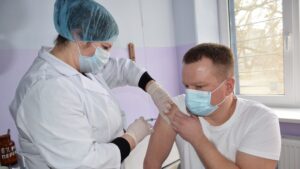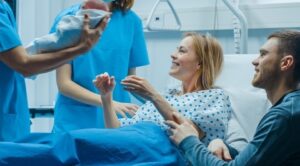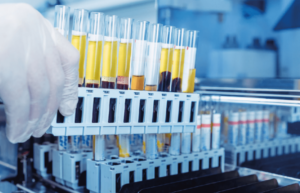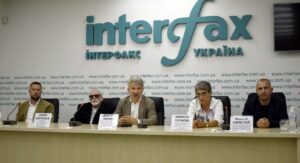
In the first half of 2024, the National Health Service of Ukraine (NHSU) will conduct scheduled monitoring of 63 contracted healthcare facilities.
According to the agency on its website, the list of medical institutions to be monitored was determined based on the results of calculating a system of indicators that can confirm or refute the existence of risks in the work of clinics.
The monitoring will be conducted in medical facilities contracted under the packages “Medical Care for Acute Cerebral Stroke”, “Medical Care for Acute Myocardial Infarction”, “Medical Care during Childbirth”, and “Medical Care for Newborns in Complicated Neonatal Cases”.
In particular, the monitoring will be conducted in 16 clinics contracted for the acute cerebral stroke package, 11 clinics contracted for the acute myocardial infarction package, 28 medical institutions contracted for the maternity care package, and eight clinics contracted for the neonatal care package.
In addition, the NHSU informs that the list of medical institutions to be monitored will be supplemented by institutions that have a rehabilitation contract.

In 2023, the National Health Service of Ukraine (NHSU) paid UAH 133.8 billion under the Medical Guarantee Program, and 16 million Ukrainians received medical care.
According to the NHSU in its press release, in particular, in 2023, UAH 99 billion was allocated to pay for specialized medical care, UAH 23 billion for primary healthcare services, and UAH 11 billion for emergency medical care.
The NHSU reminds that in 2024, the financing of the PMG will be increased by 12% to UAH 159 billion.
The 2024 PMG covers 44 service packages, including three new packages: “Treatment of infertility with the help of assisted reproductive technologies”, “Treatment of adults and children by organ transplantation” and “Treatment of adults and children by hematopoietic stem cell transplantation”.
At the same time, the NHSU clarified that the National Service will pay UAH 60,324 thousand for one full cycle of infertility treatment.

Since the beginning of 2023, the National Health Service of Ukraine (NHSU) has paid over UAH 2.22 billion to medical institutions for medical care in case of acute cerebral stroke and acute myocardial infarction.
According to the NHSU press service, since the beginning of 2023, more than 78.8 thousand patients have received medical care for acute cerebral stroke and more than 21 thousand patients for acute myocardial infarction under the Medical Guarantee Program (MGP).
In addition, the NHSU reminds that 232 brand names of medicines for the treatment of cardiovascular diseases and primary and secondary prevention of heart attacks and strokes are currently participating in the Affordable Medicines reimbursement program.
More than 13.6 thousand private and municipal pharmacies have agreements with the NHSU to participate in the reimbursement program.
229 medical institutions have contracts with the NHSU for the treatment of acute cerebral stroke, and 74 institutions have contracts for the treatment of acute myocardial infarction. In particular, during stroke treatment, a medical facility receives UAH 131,472 for endovascular interventions, UAH 62,565 for thrombolytic therapy, and UAH 14,952 for care without endovascular interventions or thrombolytic therapy.
For the treatment of a heart attack with stenting, a healthcare facility receives UAH 43,573; if stenting is not performed, the NHSU pays UAH 25,261 for medical care provided during a heart attack.

The National Health Service of Ukraine (NHSU) for January-July 2023 under the package “Medical assistance in childbirth” paid 101104 births.
As reported to the agency Interfax-Ukraine in the NHSU, for the same period in 2022, the NHSU paid 109405 births, in 2021 – 141153 births.
The NHSU specified that currently 306 medical institutions are contracted for the package of medical care during childbirth.
As reported, in 2023 tariffs for medical care during childbirth is from 15,137 UAH.

CSD LAB medical laboratory began operating within the framework of the Medical Guarantees Program (MPG), allowing patients to receive free laboratory tests as directed by their physician.
According to a press release from the laboratory, the list of services available under the PMG includes more than 400 tests.
In order to take laboratory tests in the CSD LAB network under PMG, a patient must have an electronic referral from a family physician or a physician of any specialty created in the Electronic Health System (EHS). The results of the laboratory tests performed under the Medical Assurance Program are transmitted to the EHR, as in the case of the state laboratories.

The lab specifies that patients will be able to choose a lab office, date and time of their visit, and make an appointment online.
“We were the first private laboratory to contract with the National Health Service of Ukraine (NHSU). We have a long and quite effective cooperation with medical institutions of all forms of ownership to ensure accurate laboratory diagnosis and its maximum accessibility to all segments of the population. This decision was logical and reasonable, as it expands possibilities for both patients and doctors”, – informed Alexander Dudin, CSD LAB General Director and co-owner.
The CSD LAB, one of the leading laboratories in Ukraine, provides over 1500 analyses, from general blood analysis to genetic disorders in tumors by NGS method, and for 12 years has been one of the largest pathomorphological laboratories in Eastern Europe.
The CSD LAB has six laboratories: pathomorphology, cytomorphology, oncohematology, microbiology, clinical diagnostic laboratory and molecular genetics center. CSD LAB performs more than 1.5 million tests annually.
Production facilities and modern high-tech equipment are located in Kiev and Lviv on a total area of more than 5 thousand square meters, as well as in Moldova and Georgia.

The military aggression of the Russian Federation and active hostilities gave a powerful impetus to the development of the direction of rehabilitation in Ukraine, but the war showed the need to develop approaches to the rehabilitation of military traumas, according to the participants of a roundtable on topical issues of medical and psychological rehabilitation held at Interfax-Ukraine on September 5.
“We started building a rehabilitation system in Ukraine since 2014, but today there are problems that have not yet been resolved. The rehabilitation system depends on many things, including money, because rehabilitation is quite an expensive thing,” Executive Director of the Ukrainian Association for Stroke Prevention (UABI), doctor of physical and rehabilitation medicine Maryna Huliayeva said.
Huliayeva said that in “those clinics that do not have multidisciplinary teams for rehabilitation, rehabilitation is at a low level, the lack of specialists leads to the fact that the process and quality of rehabilitation care is hindered.”
Commenting on the rehabilitation packages, according to which the National Health Service of Ukraine (NHSU) contacts clinics under the Medical Guarantee Program, the expert said that “most of the package is spent on a patient who is already stabilized, but the issue of acute rehabilitation is hung.”
“Unfortunately, it happens that the stroke unit does not have a physical therapist in staff, but there is one in a rehabilitation department. Therefore, there is not enough staff for acute rehabilitation, where major complications are prevented,” she said.
Huliayeva said that, in particular, the military and patients with military traumas should also be examined by a specialist in physical and rehabilitation medicine, but there are no such specialists in military hospitals, so these patients are consulted by civilian doctors.
“I think that such medical care should be developed within the framework of the financing of the Armed Forces of Ukraine. Military doctors are ready to cooperate, we advise military hospitals, we come once or twice a week, we accept them for a rehabilitation package, we work with them,” she said.
At the same time, Huliayeva said that the approach to the rehabilitation of the military should take into account the purpose of rehabilitation, which depends on the severity of traumas.
Huliayeva believes that to develop the rehabilitation of the military, a decision is needed at the state level, “to introduce those positions [in the area of rehabilitation] in military hospitals that were introduced into civilian medicine.”
According to Huliayeva, in addition to introducing rehabilitation into military rehabilitation, it is necessary to develop palliative medicine, as well as rehabilitation at the outpatient level.
In turn, Vadym Kerestey, head of the rehabilitation direction of the ADONIS medical group of companies, also said that the war gave a start to the development of rehabilitation medicine, but if “civilian rehabilitation medicine develops, then rehabilitation in the military in hospitals stands still.”
“Unfortunately, there is a catastrophic lack of specialists. They do not open positions for physical therapists, ergotherapists and other specialists who are part of multidisciplinary teams. There are no such rehabilitation teams in military hospitals that could provide high-quality medical care specifically for the military, who often have severe polytrauma,” he said.
The expert said that “military hospitals are overcrowded with patients with severe traumas, but there are not enough specialists.”
“It is important that the military introduce the position of physical therapists in military hospitals. Perhaps the subcommittee of the Verkhovna Rada, which deals with rehabilitation, could initiate this, so that positions of doctors of physical and rehabilitation medicine could be opened in the military structures,” Kerestey said.
Commenting on the development of rehabilitation in military medicine, Kerestey also noted the importance of rehabilitation goals.
“Rehabilitation terms vary from several weeks to several months, since different patients may have different goals of rehabilitation. For some, this is a return to the ranks of the Armed Forces of Ukraine, for others, at least self-service,” he said.
He also believes that at present in Ukraine “the number of qualified doctors of physical and rehabilitation medicine is very small, they are sorely lacking.” In particular, according to Kerestey, currently in Kyiv “there are about five to six rehabilitation high-quality rehabilitation centers where patients can be treated, starting with intensive care units,” the rest of the centers in Kyiv can only work with already stabilized patients, and things are much worse in the regions.”
“Rehabilitation requires equipment, but it is not the main thing. It is important that the department has specialists: psychologists, ergotherapists, physical therapists, their assistants,” he said.
At the same time, Yehor Prokopovych, head of the Department of Physical and Medical Rehabilitation at Kyiv City Hospital No. 6, said that this clinic has enough specialists of the required profile. At the same time, in connection with the war, the hospital also accepts military personnel for treatment.
“Before March 2022, our hospital accepted [for rehabilitation] only patients with stroke and for rehabilitation under the orthopedic package. Since March, the hospital has been included in the list of hospitals that provide rehabilitation to the military, and we had to reorganize something in our work. For example, we did not know that narcotic analgesics could be prescribed in rehabilitation, that there could be patients with colostomy, with concomitant traumas, that they could have complications that we did not foresee in rehabilitation. We had to learn how to treat in rehabilitation and pneumonia, and cystitis, and urethritis, and much more,” he said.
Prokopovych said that before the war, the department had mainly “patients aged above 50, and now they are young patients who have severe injuries.”
The expert also stressed the absence of “the NHSU package for military rehabilitation.”
“We code them as ordinary neurological patients, and since the beginning of the war we have not received any clarification from the NHSU regarding the military,” he said.
“We see a big push in the field of rehabilitation, but there are practical problems. For example, this is the transfer of a patient from us to another medical facility, building codes or equipment. For example, now we need two devices for the rehabilitation of the military, one of them costs about EUR 10,000, the second is EUR 14,000,” he said.
For his part, commenting on the issues of psychological rehabilitation in wartime, psychiatrist and psychotherapist Yevhen Voronkov said that “not everyone has PTSD, but many people suffer from PTSD and complex PTSD.”
“It is necessary to distinguish between PTSD in combatants and in the civilian population who suffered from the consequences of the occupation, violence, bombing. In many cases, people turn to the general psychiatric service, but this is a level of disorders that no psychiatric services are adapted to in reality,” he said.
At the same time, according to Voronkov, psychiatric education is currently focused on the treatment of severe mental illness, and not the treatment of conditions “that require individual and long-term, but mainly psychotherapeutic management with some medication component and pharmacological support.”
Voronkov believes that there are specialists in Ukraine who can be qualified to work with a person in war conditions in a psychotherapeutic sense, including in the direction of PTSD, “but they are not trained in public structures, they are trained as part of international projects, most of them work individually or in small teams.
“Some of our psychotherapists work with those who have returned from captivity, have received severe injuries. But these are only a few of the therapists who are involved in the work. There is a problem in training military psychologists or psychologists,” he said.
The expert said that the psychological rehabilitation of patients in wartime requires a conceptual development, since “this is a new situation in such a mass plan, it is only six months old.”
“Neither the structure nor the characteristics of these patients is clear. There is only a general understanding of what to do with it. And it is clear that patients need to be distinguished: one thing is those who were in the occupation, the other is the military, the third is children, internally displaced persons, and so on. It will be a large complex, for which, I believe, the psychiatric service is not ready,” he said.
In addition, Voronkov said that “there are no systematic studies of the military on PTSD.”
“Such studies require a pool of patients, besides, PTSD does not occur immediately, it is a delayed syndrome. A burst of PTSD can manifest itself in its most real forms several months after traumatic situations. Sometimes it is weeks, but more often after months we can see the formation of specific PTSD. It is difficult to work with such patients, this is a very difficult contingent not only for rehabilitation, but also for treatment in an acute condition,” he said.
At the same time, Voronkov said that the developments that were made by foreign specialists in the course of local military conflicts of past years may now be ineffective in Ukraine, since “it is necessary to take into account huge transcultural differences, in psychology the transcultural aspect is very important.”
“Severe PTSD is a very serious disease. Doctors are not adapted to work in such conditions, it is impossible to train such specialists in advance,” he said.
In turn, the head of the Department of Nephrology and Renal Replacement Therapy of the National University of Health Protection, Professor Dmytro Ivanov said that the Ukrainian Association of Nephrologists, based on international experience, prepared recommendations for rehabilitation in the specialty of nephrology.
“They relied on world experience, because there are military conflicts, and there is an array of information to form recommendations,” he said.
At the same time, according to Ivanov, about 600 out of nearly 10,000 Ukrainians, who were on dialysis at the beginning of the war, left for the EU countries.
CONFERENCE, Huliayeva, KERESTEY, MEDICINE, nhsu, Prokopovych, REHABILITATION, АДОНИС, Воронков, ИВАНОВ, уаби